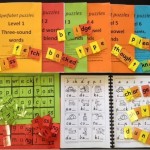Silent letters
0 Replies
In talk about spelling, letters are often said to be "silent", for example the "e" at the end of the words "rate", "hide", "note" and "use".
The idea is that only the first letters in these spellings are doing the sound-representing, the other, silent letters are just hanging around, reminding us not to say "rat", "hid", "not" and "us".
It's not just the letter "e" that gets gagged in this way. Also silenced are the "k" in "know", the "g" in "sign", the "h" in "what", the "b" in "lamb", the "u" in "guess", the "t" in "listen", the "n" in "autumn" and many more.
Old pronunciations
I don't find "silent letters" a useful way to describe or explain such spellings. Pretty much every letter in a word is there for a reason.
Sometimes the word was pronounced differently hundreds of years ago, and over time its sound has changed, but how it's written (being ink, and all) has remained the same, or changed less.
The word "knight" started out as Old English "cniht", which did have a "k" sound. It also had a sound for the "h", probably a strange cross between "h" and "sh", which English doesn't use these days.
You can look word origins up in good dictionaries, or there's a free etymology dictionary online, which I particularly like because it seems to have been created for no material gain (no ads!) by a good-sounding chap called Douglas Harper. He does his research but doesn't guarantee his site is 100% accurate, but until they invent time travel that's true of etymology generally.
Connecting related words
Sometimes a "silent letter" is part of a word root, and usefully connects words of similar meaning, with the letter being pronounced in some words and not others.
Consider "sign", "signal", "signature", "signatory", "signet ring" and "signify".
Not silent letters, not bossy e, just part of the vowel spelling
Instead of telling learners that the word "rate" has a "silent letter" e, I say its spelling is r + a…e + t, and the t goes in between the two letters of the a…e.
I show them how this is done using my movable alphabet.
It's not just the letter a in "rate" that represents the vowel sound, it's both the a and the e, working together.
The letter e in such words acts a bit like the little marks on letters (diacritics) used in many other languages, which we sometimes retain in borrowed French words like café, fête and façade.
We don't say these are "silent circumflexes" or "silent cedillas" or "silent acute accents" and neither is it really very accurate to relegate letters performing like this to the "silent letters" corner. They're important components of these spellings.
Homophones and outlier spellings
Another useful thing supposedly silent letters do is help us tell the difference in print between homophones (not/knot, rain/rein/reign, him/hymn, time/thyme, wet/whet).
When it comes to unusual patterns like the "sw" in "sword" and "answer", I just say "that's a funny way to write the sound "s", isn't it, sw? I can't think of any other words that have it spelt like that".
Then we check this website's spelling lists for others, and also find "Muswellbrook". If you know of others, please tell me and I'll add them to the list.
Ok, there are a few French silent letters
The only time I'm tempted to talk about "silent" letters is when working with mostly French-origin words like "honest", "fracas", "ballet", "faux" and "chez", where there's really no other way to explain the spelling except that they're French, and that's what French is like, oh mon dieu (do you think the French txt OMD and RSPR?).
Something like a third of English words come from French, and we've anglicised most of the pronunciations – consider how Sherlock Holmes says "impossible" compared with how Hercule Poirot says it. This includes pronouncing letters they don't pronounce (e.g. the "h" in "hospital" and "horrible"), though not in every dialect (consider how Americans say "herbs").
But some French words have retained both their pronunciation and spelling, with some silent letters. You can find lists of such words grouped by pattern here. If you know of one that's missing, please email me and I'll add it to the list.



Leave a Reply